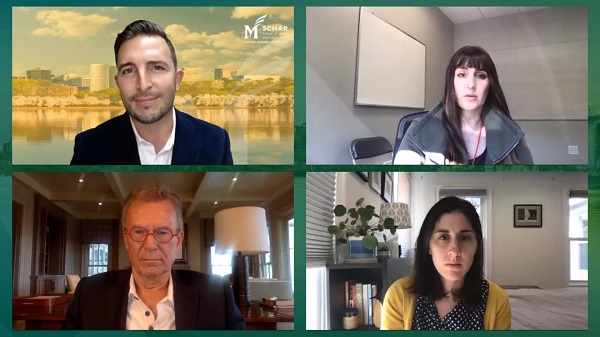In This Story
Originally published on November 16, 2020
There's a Power Lunch every Friday at the Schar School of Policy and Government until January 15. Professor Justin Gest moderates a virtual discussion with influential political leaders, journalists, and experts addressing crucial topics affecting the next four years of U.S. public policy. All events stream live on the Schar School’s YouTube channel. (The Schar School is closed the Fridays of Thanksgiving, Christmas, and New Year's Day.)
Here’s a recap of last week’s program on the topic of healthcare. (Zeke Emanuel, vice-provost at the University of Pennsylvania and senior fellow at the Center for American Progress, was originally scheduled to participate. At the time of the Power Lunch, Emanuel learned that he had been appointed to President-Elect Joe Biden’s COVID-19 task force.)
Tom Daschle, former U.S. Senator (D-SD) and Senate Majority Leader:
“We just need broader participation for whatever it is we ultimately decide to do. We haven’t gotten that yet. There has been great resistance among some states, including my original state of South Dakota, to many of these issues. So, we have to get greater participation and more unified leadership as we address the challenges we know we’re going to face in the next several months especially.”
“Working with Congress, of course, is critical. We need another COVID relief bill. We’ve got to get that, because resources are just stretched to the maximum right now in all states. States and healthcare facilities across the board need more resources for testing, for tracing. There’s a lot of testing that still needs to be done. We have the vaccine coming on. We’ve got to make sure that we have equitable distribution and efficient distribution. This could be very complicated.”
“There’s just a myriad of things we have to do around policy, around execution, of the plan I think is currently unfolding. It is going to take bi-partisan cooperation in order to do it effectively.”
Sarah Kliff, an investigative reporter focused on healthcare for the New York Times:
“I think what’s been especially challenging is that you have a set of hospitals—larger, private hospitals—that are probably going to weather this fine. They’re going to lose a significant amount of money, but they had a big cushion coming into the pandemic. Then you have rural hospitals, safety-net hospitals, which don’t have that cushion, and often are dealing with one or two weeks of cash-on-hand.”
“We haven’t seen that additional round of stimulus. There’s on and off talks about it here in Washington. We don’t know when it’s going to happen. But it seems like if we go through another wave, and you want to keep the healthcare system up and standing, you are probably going to have to do more of that provider-relief work.”
“We’ve now seen seven ballot initiatives to expand Medicaid, most of them, by their nature, are in more conservative states that have declined to accept it on their own. Six of them have passed.”
Epidemiologist Saskia Popescu, a term professor in the Biodefense Program at the Schar School:
“If we’re going to go down into a closure, a shut-down, a stay-at-home order, however you want to call it, I think the biggest task is to get everybody on board and to use that time effectively.”
“I think people get very nervous when you talk about shut-downs—that’s a very hard term. But if we look at what can be done in more of an incremental stay-at-home order, or a closure, that could be much more successful.”
“Curfews really don’t work…”
Justin Gest’s Takeaway: “Infecting and killing millions, COVID-19 has tested the limits of science, medicine, and healthcare systems in every corner of the globe. Here in the United States, there are debates over the future of the Affordable Care Act and the role of government in the provision of healthcare…Just yesterday, the U.S. recorded more than 145,000 new COVID-19 cases to set a new record-high. In some areas of the country the number of hospitalizations is already pushing hospital staff to the brink.”
Next up on Power Lunch: Economic policy as America looks to the future. Participants include Annie Lowrey, The Atlantic; Betsey Stevenson, formerly Council of Economic Advisers; and Mason Robinson Professor of Public Policy and Washington Post columnist Steven Pearlstein. See previous Power Lunch programs.

